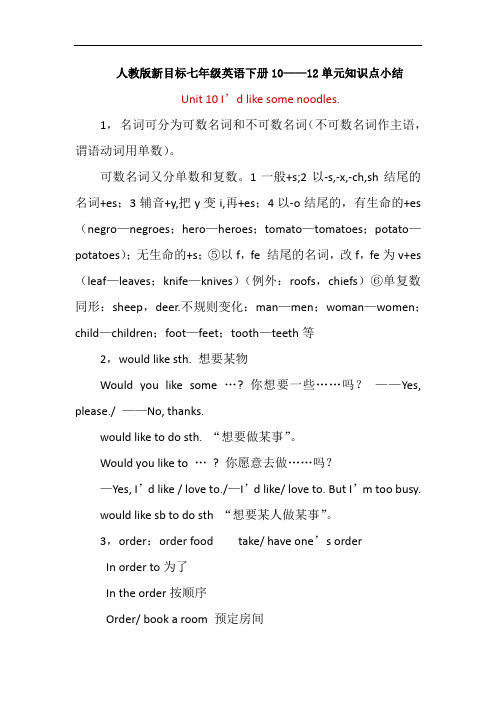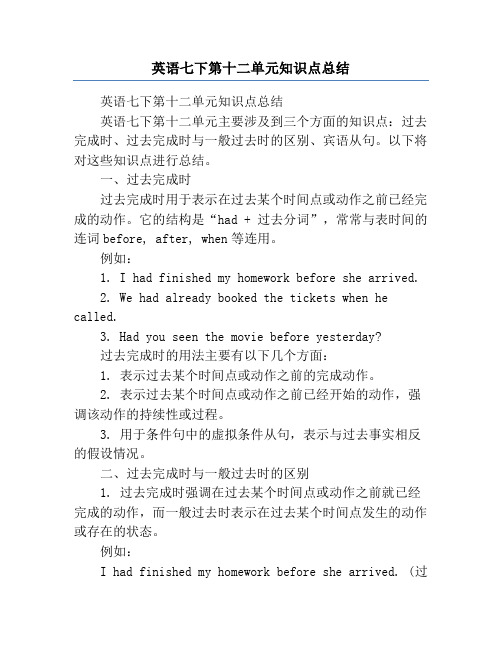2020年春人教新目标英语七年级下册unit-12单元知识点复习总结
- 格式:doc
- 大小:37.00 KB
- 文档页数:2

在句子时态为一般过去时的特殊疑问句中,当谓语动词为实义动词时,需要助动词did来辅助,其句子结构为“特殊疑问词+ did +主语+ do (实义动词)+其他?”。
如:What did you buy yesterday from the market?昨天你从市场里买了什么?How did you get to the airport this morning?今天早上你是怎么去的机场?注意:当特殊疑问词在句中作主语时,其句子结构为“特殊疑问词+did (实义动词的过去式)+其他? "。
如:Who broke the glass?谁打碎了玻璃?What happened?发生了什么?一般过去时结构:do含有行为动词的一般过去时的肯定句、否定句以及疑问句句式结构如下:肯定句:主语+动词的过去式+其他.例:I helped him with his English last week.否定句:在行为动词前加did not,缩写形式是didn' t,即:主语+didn ' t + 动词原形+其他.例:I didn ' t help him with his English last week.一般疑问句:在句首添加助动词Did,其后的动词为原形,即:Did+主语+动词原形+其他?肯定回答为:Yes,主语+did.;否定回答为:No,主语+didn ' t.例:-Did you go to the party last night?-Yes, I did./No, I didn ' t.特殊疑问句:特殊疑问词(主语的定语)+主语+动词过去式+(其他)?特殊疑问词(作主语)+动词过去式+(其他)?例:Which class won the first prize?Who knocked on the door?或:特殊疑问词(作其他成分)+ did +主语+动词原形+(其他)?例:Where did you buy the dictionary?——般过去时中常见的时间词:ago, yesterday, the day before yesterday,the other day, last week, last (year, night, month …),in1989, just now, long ago, once upon a time, etc.如:Once upon a time, there was a beautiful girl named Snow White.从前,有一个叫白雪公主的美丽的女孩。

人教版新目标七年级英语下册10——12单元知识点小结Unit 10 I’d like some noodles.1,名词可分为可数名词和不可数名词(不可数名词作主语,谓语动词用单数)。
可数名词又分单数和复数。
1一般+s;2以-s,-x,-ch,sh结尾的名词+es;3辅音+y,把y变i,再+es;4以-o结尾的,有生命的+es (negro—negroes;hero—heroes;tomato—tomatoes;potato—potatoes);无生命的+s;⑤以f,fe 结尾的名词,改f,fe为v+es (leaf—leaves;knife—knives)(例外:roofs,chiefs)⑥单复数同形:sheep,deer.不规则变化:man—men;woman—women;child—children;foot—feet;tooth—teeth等2,would like sth. 想要某物Would you like some …? 你想要一些……吗?——Yes, please./ ——No, thanks.would like to do sth. “想要做某事”。
Would you like to …? 你愿意去做……吗?—Yes, I’d like / love to./—I’d like/ love to. But I’m too busy.would like sb to do sth “想要某人做某事”。
3,order:order food take/ have one’s orderIn order to为了In the order按顺序Order/ book a room 预定房间Order sb(not)to do sth命令4,special和especialSpecial特别的人或事物,特别的,特殊的,specials特色菜;specially专门地,特地Especial特别的,突出的,especially特别,尤其5,the number of表示“……的数量”,后面接可数名词复数。

英语七下第十二单元知识点总结英语七下第十二单元知识点总结英语七下第十二单元主要涉及到三个方面的知识点:过去完成时、过去完成时与一般过去时的区别、宾语从句。
以下将对这些知识点进行总结。
一、过去完成时过去完成时用于表示在过去某个时间点或动作之前已经完成的动作。
它的结构是“had + 过去分词”,常常与表时间的连词before, after, when等连用。
例如:1. I had finished my homework before she arrived.2. We had already booked the tickets when he called.3. Had you seen the movie before yesterday?过去完成时的用法主要有以下几个方面:1. 表示过去某个时间点或动作之前的完成动作。
2. 表示过去某个时间点或动作之前已经开始的动作,强调该动作的持续性或过程。
3. 用于条件句中的虚拟条件从句,表示与过去事实相反的假设情况。
二、过去完成时与一般过去时的区别1. 过去完成时强调在过去某个时间点或动作之前就已经完成的动作,而一般过去时表示在过去某个时间点发生的动作或存在的状态。
例如:I had finished my homework before she arrived. (过去完成时)I finished my homework before she arrived. (一般过去时)2. 过去完成时常与表示过去时间的时间状语连用,而一般过去时则不一定。
例如:I had been to London before. (过去完成时)I went to London last year. (一般过去时)3. 过去完成时常与一般过去时同时出现,表示在过去某个时间点或动作之前已经完成的动作与在过去某个时间点发生的动作之间的先后关系。
例如:He had finished his work when I called. (过去完成时)He finished his work and then I called. (一般过去时)三、宾语从句宾语从句是指作为宾语的从句。

七年级英语下册Unit1-12单元知识归纳复习(新版)人教新目标版七年级英语下册 Unit 1-12单元知识归纳复习(新版)人教新目标版Unit 1 Can you play the guitar?词汇拓展1. sing(现在分词)singing2. dance(现在分词)dancing3. swim(现在分词)swimming4.draw(同义词)paint5. story(复数)stories6. Write (同音词)right7. drum(复数)drums8. piano(复数)pianos9. also (同义词)too/eithermake(单三)makes (现在分词)making 11. Center(形容词)central teach(名词)teacher 13. musician(形容词)musical二、重点短语与句型1. play chess 下国际象棋 speak English 说英语play the guitar 弹吉它want to do…想做……2. be good at 擅长于 what club /sports 什么俱乐部/运动music /swimming /sports club 音乐/游泳/运动俱乐部be good at doing sth.= do well in doing sth. 擅长做某事like to do …喜欢做… What about…?…怎么样?be good at doing…擅长做… tell stories 讲故事the story telling club 讲故事俱乐部G7BU1p23. talk to 跟…..说 write stories 写小说want …for the school show为学校表演招聘…… after school 放学后 do kung fu 打中国功夫 come and show us 来给我们表演4. play the drum 敲鼓 play the piano 弹钢琴play the violin 拉小提琴 G7BU1p45. be good with 善于应付(处理)…的;和某人相处很好make friends 结交朋友 help sb. with sth在某方面帮助某人on the weekend 在周末 help with...帮助做……be free /busy 有空/很忙call sb. at…拨打某人的……号码 need sb./sth. to do…需要某人/某物做……English-speaking students说英语的学生join…… the club加入…俱乐部,be in=join in …成为…中的一员G7BU1p6三、关键句型1. Can you draw? Yes, I can. / No, I can’t.2. What club do you want to join? I want to join the chess club.3. You can join the English club. Sounds good.4. I can speak English and I can also play soccer.5. Please call Mrs. Miller at 555-3721.Unit 2 What time do you usually go to school?一、词汇拓展1. up(反义词)down2. brush(单三)brushes3. tooth(复数)teeth4. alway (反义词)never5.early(反义词)late6. work(同义词)job7. night(反义词)day 8. half(复数)halves 9. run(现在分词)running 10. clean(现在分词)cleaning 11. either…or…(反义词)neither …nor…12. life(复数)lives 13. taste(单三)tastes 14.leaf(复数)leaves二、重点短语与句型1.get up 起床,站起get dressed穿上衣服 have/take a shower 洗淋浴brush teeth涮牙eat breakfast 吃早餐 What time 几点,何时go to school 去学校 do homework 做家庭作业G7BU2p72. at night 在晚上from…to…从……到……G7BU2p8in the morning 在上午 go to work 去上班That's a funny time for…那是做……有意思的时间。

七年级下册英语unit_112单元全册知识点归纳与复习总结七年级下册英语unit_12单元全册知识点归纳与复习总结在七年级下册的英语学习中,我们学习了unit_12单元的知识点。
本文将对这个单元的内容进行归纳与复习总结,以帮助大家回顾和巩固所学的知识。
本文主要分为以下几个部分: Listening(听力)、Speaking(口语)、Reading(阅读)、Writing(写作)和Grammar(语法)。
一、Listening(听力)在本单元的听力部分,我们学习了一些与家庭、爱好和日常活动相关的对话和短文。
通过听力练习,我们可以提高我们的听力理解能力,学会抓住重点信息。
在做听力练习时,我们需要注意细节,抓住关键词,并学会使用上下文推测词义。
二、Speaking(口语)在本单元的口语部分,我们学习了一些描述家庭成员和日常活动的表达方式。
通过口语练习,我们可以提高我们的口语交流能力,学会用简单准确的语言描述人物和事物。
在进行口语练习时,我们可以多参考课本中的例句,尽量做到语音准确、流利表达。
三、Reading(阅读)在本单元的阅读部分,我们学习了一些关于家庭、爱好和日常活动的短文。
通过阅读这些短文,我们可以提高我们的阅读理解能力,学会从文章中获取信息。
在做阅读练习时,我们需要注意文章的结构和组织方式,抓住关键信息。
四、Writing(写作)在本单元的写作部分,我们学习了一些描述家庭、爱好和日常活动的写作表达。
通过写作练习,我们可以提高我们的写作能力,学会用简单明了的语言表达自己的观点。
在进行写作练习时,我们需要注意文章的结构和组织,合理安排段落和句子。
五、Grammar(语法)在本单元的语法部分,我们学习了一些关于现在进行时和一般现在时的用法。
通过学习这些语法知识,我们可以正确地描述正在进行的动作和经常发生的动作。
在运用这些语法知识时,我们需要注意动词的变化和句子的时态一致性。
综上所述,七年级下册英语unit_12单元的内容主要包括Listening、Speaking、Reading、Writing和Grammar。

⼈教版七年级下册-Unit-12--教材详解和知识点归纳Section Aby the lake (P. 67) camp 作名词,营地 summer/winter camp 夏/冬令营camp 作V.,表⽰“扎营、搭帐篷”,go camping“去野营”;camp out“野营、露营”。
Where did you camp last night拓展归纳: do some cleaning/cooking/shopping/reading/washing 打扫/做饭/购物/阅读/洗⾐服goswimming/fishing/camping/skating/boating/climbing/walking 游泳/钓鱼/露营/滑冰/划船/爬⼭/散步2. I fed some sheep. (P. 68)sheep 可数名词,“绵⽺”,复数还是sheep;How many sheep are there on your farm"拓展:常见的单复数同形的名词还有:fish (鱼的数量),Chinese (中国⼈),Japanese(⽇本⼈)。
3. Who visited her grandma Becky did. (P. 68)英语中为了避免重复,经常⽤do/does/did, so等来代替前⾯的动词或相关内容,且时态同问句⼀致。
答句Betty did.中的did代替问句中visited her grandma,完整的句⼦是:Betty visited her grandma.。
1)——Did Mischa say that——Yes,he did.(did代替said that)⽶萨说的是的,他说的。
2)——Do you think he is clever——I think so.(so代替he is clever)你认为他聪明吗我认为如此。
worked as a guide at the Natural History Museum. (P. 68)as此处⽤作介词,表⽰“作为、当作”,后接表⽰职业的名词。
人教版七年级英语下册7-12单元知识点总结(word版可编辑修改) 编辑整理:尊敬的读者朋友们:这里是精品文档编辑中心,本文档内容是由我和我的同事精心编辑整理后发布的,发布之前我们对文中内容进行仔细校对,但是难免会有疏漏的地方,但是任然希望(人教版七年级英语下册7-12单元知识点总结(word版可编辑修改))的内容能够给您的工作和学习带来便利。
同时也真诚的希望收到您的建议和反馈,这将是我们进步的源泉,前进的动力。
本文可编辑可修改,如果觉得对您有帮助请收藏以便随时查阅,最后祝您生活愉快业绩进步,以下为人教版七年级英语下册7-12单元知识点总结(word版可编辑修改)的全部内容。
Unit 7 It’s raining!◆短语归纳1。
not bad 不错2。
at the park 在公园3. take a message for … 为……捎个口信4。
have a good time / have a great time / have fun / enjoy oneself 过得很愉快5。
call sb。
back 给某人回电话 6. no problem 没问题7. right now 现在8. talk on the phone 通过电话交谈9。
some of ………当中的一些10。
by the pool 在游泳池边11。
drink orange juice 喝橙汁12。
study hard 努力学习13. on a vacation 在度假14。
in the mountains 在山里15. call sb. 给某人打电话16。
write to sb。
给某人写信17. right for… 适合…… 18. 给……拍一张照片◆用法集萃1。
tell sb. (not)to do sth. 告诉某人(不要)做某事◆典句必背1. How’s the weather?天气怎么样?2. It's cloudy. / It's sunny. / It’s raining。
七年级下册英语unit12知识点总结Unit 12是七年级下学期的最后一个模块,通过这个模块的学习,同学们可以巩固并深化自己在英语学习方面的掌握和理解。
在这个模块中,同学们将学到以下方面的知识:一、名词的复数形式在英语语言中,名词可以是单数形式或者复数形式。
在单数形式下,名词只有一个,而在复数形式下,名词有两个或者更多。
在这个模块中,同学们需要掌握名词单数和复数形式之间的转换规则。
1.第一类:在名词末尾加 -s例:book-books, pen-pens, car-cars2.第二类:在以字母x, sh, ch, s结尾的名词末尾加 -es例:box-boxes, brush-brushes, watch-watches, bus-buses3.第三类:以辅音字母+y结尾的名词,把y改成i,再加-es。
例:baby-babies, city-cities, family-families4.第四类:以o结尾的名词,有些加-s,有些加-es例:tomato-tomatoes, potato-potatoes, radio-radios二、动词的过去式在英语语言中,动词可以分为不同的时态,其中过去式是比较常用的一种。
在这个模块中,同学们需要掌握一些常用动词的过去式及其用法。
1.第一类:一般情况下,动词的过去式加-ed。
例:work-worked, like-liked, jump-jumped2.第二类:以字母e结尾的动词,直接加-d。
例:dance-danced, love-loved, hate-hated3.第三类:以辅音字母+y结尾的单词,先将y改为i,再加-ed。
例:study-studied, try-tried, carry-carried4.第四类:一些特殊的过去式。
例:be-was, is-was, have-had三、情态动词情态动词是指表示情态或考虑的动词,如can, could, may, might, must, shall, should等。
2020年春人教新目标英语七年级下册单元知识点总结Unit 12 What did you do last weekend?—How was the ice-cream? —It was delicious.—How were the apples? —They were expensive.—What did you do? —I went to the beach.—Who stayed at home? —Becky did.—Who did you stay with? —I stayed with…—Where did you go? —I went to …—How did you go? —I went there by bike. = I rode a bike there.—How was the weather? —It was sunny. / The weather was sunny.—How was the trip? ——I thought the trip was boring.boring—Did you do anything interesting last week? —Not really, but I……relaxingby the lake在湖边camp露营;扎营go camping露营put up a tent~put up tents搭帐篷move移动go boating划船play badminton打羽毛球go to the beach去海滩run away逃跑fly a kite go to the cinema=go to the movies watch a movie~watch movies go fishing钓鱼draw a picture of~draw pictures of tell sb. about告诉某人某事living habits生活习惯swimming pool study for a test为…学习make a fire生火look out of往外看into到…里面onto到…上面useful lesson有用的nature自然~natural自然的错) →Were you busy?(对) 当用到助动词do/does/did, 拿句子中必须找得到动词v 错) →Did he watch TV?(对) 如果句子中没有动词, 就用be动词具体某天早中晚用on: On Sunday morning, On Monday night, On the first night, On my birthdaylearn a lesson: 得到教训;吸取经验learn a lesson from: 从…得到教训teach sb. a lesson: 给…一个教训They have a butterfly house with over 200 kinds of butterflies.What did you do on last weekend? next/ last/ yesterday morning等前面不加介词What will you do in next month?What did you do on yesterday morning? (错)I saw some sheep. I saw some deer.I worked as a guide. 我以前工作是导游。
人教版七年级下册英语Unit 12 知识点总结Unit 12 What did you do last weekend? 一、词汇与短语◆重点单词A部分1.camp 扎营;搭帐篷v.2.lake 湖;湖泊n.3.beach 海滩;沙滩n.4.badminton 羽毛球运动n. 5.sheep 羊;绵羊n.6.as 作为;当作prep. 7.natural 自然的adj.8.butterfly 蝴蝶n.9.visitor 游客;访问者n.10.tired 疲倦的;疲劳的adj. 11.stay 停留;待v.12.away 离开;远离adv. 13.mouse 老鼠;耗子n.14.baby 幼小的adj. 婴儿n. 15.shout 呼叫;喊叫v.16.language 语言n.B部分1.fly 飞v.2.India 印度n.3.kite 风筝n.4.tent 帐篷n.5.high 高的(地) adj.&adv.6.moon 月亮n.7.ago 以前adv.8.surprise 惊奇;惊讶n. 使吃惊v. 9.snake 蛇n.10.scared 惊慌的; 吓坏了的adj. 11.move 移动v.12.start 开始;着手v.13.jump 跳; 跃v.14.wake 弄醒;醒v.15.into 到……里面;进入prep.16.forest 森林n.17.ear 耳朵n.◆重点短语A部分1.stay up late深夜不睡;熬夜2.run away跑开3.shout at……冲……大声4.last weekend 上周末5.go boating 去划船6.camp by the lake 湖畔扎营7.one's living habits某人的生活习惯8.feed sheep 喂羊9.as a guide作为一名导游10.butterfly house 蝴蝶馆11.tell sb. about……告诉某人关于……12.go with sb. 和某人一起去13.have a good weekend 度过一个愉快的周末14.play badminton 打羽毛球B部分1.fly a kite 放风筝2.high school 中学3.put up 搭起;举起4.each other 互相;彼此5.get a surprise 吃惊6.shout to……对……大声喊叫7.up and down 上上下下;起伏8.wake……up 把……弄醒9.a special gift 一件特殊的礼物10.take a long bus ride to 乘长途车去11.put up 搭起;举起12.keep sb. warm 使某人暖和13.on the first night 在第一个夜晚14.tell a story 讲故事15.go to sleep 入睡,睡着16.look out of 朝外看17.read a book about…读关于…的书18.know about 知道关于19.start to do sth. 开始做某事20.jump up and down 跳上跳下21.move into 搬进22.make a fire 生火23.something interesting 有趣的事情24.feel……doing sth. 觉得……正在做某事25.finish high school 高中毕业26.see……doing sth. 看见……正在做某事27.clean one's room 打扫房间28.so……that……如此……以至于……29.on Saturday night 在周六晚上30.have dinner with sb.和某人一起吃晚饭31.stay at home 待在家里32.have a busy weekend度过一个繁忙的周末33.talk show 脱口秀34.study for……为……学习◆重点句子A部分1.—What did you do last weekend? 上个周末你做什么了?—I did my homework. 我做我的家庭作业了。
2020年春人教新目标英语七年级下册
单元知识点总结
Unit 12 What did you do last weekend?
—How was the ice-cream? —It was delicious.
—How were the apples? —They were expensive.
—What did you do? —I went to the beach.
—Who stayed at home? —Becky did.
—Who did you stay with? —I stayed with…
—Where did you go? —I went to …
—How did you go? —I went there by bike. = I rode a bike there.
—How was the weather? —It was sunny. / The weather was sunny.
—How was the trip? —
—I thought the trip was boring.
boring
—Did you do anything interesting last week? —Not really, but I……
relaxing
by the lake在湖边camp露营;扎营go camping露营put up a tent~put up tents搭帐篷move移动go boating划船play badminton打羽毛球go to the beach去海滩run away逃跑fly a kite go to the cinema=go to the movies watch a movie~watch movies go fishing钓鱼
draw a picture of~draw pictures of tell sb. about告诉某人某事living habits生活习惯
swimming pool study for a test为…学习make a fire生火look out of往外看
into到…里面onto到…上面useful lesson有用的nature自然~natural自然的
错) →Were you busy?(对) 当用到助动词do/does/did, 拿句子中必须找得到动词v 错) →Did he watch TV?(对) 如果句子中没有动词, 就用be动词
具体某天早中晚用on: On Sunday morning, On Monday night, On the first night, On my birthday
learn a lesson: 得到教训;吸取经验
learn a lesson from: 从…得到教训
teach sb. a lesson: 给…一个教训
They have a butterfly house with over 200 kinds of butterflies.
What did you do on last weekend? next/ last/ yesterday morning等前面不加介词
What will you do in next month?
What did you do on yesterday morning? (错)
I saw some sheep. I saw some deer.
I worked as a guide. 我以前工作是导游。
“当作;作为”go to sleep
She works as a singer. 她的工作是歌手。
=go to bed
stay up to do →He stayed up (late) to watch the soccer game. 熬夜干某事
=stay up doing →=He stayed up (late) watching the soccer game.
How+adj/adv How interesting! How slow!
How+adj/adv+主语+谓语How cold the weather is. How fast he runs.
what+adj+n What a good day! What good weather! What clean water!
Do you have a good day? language languages 语言
Do you have a a good weekend? first language 母语second language 外语
get a surprise吃惊wake up起床→ I woke up at seven.
get a terrible surprise受到惊吓wake sb. up叫醒某人→My mother wakes me up at 6 every morning. shout at 向…大喊(生气地) take…to带走He took me to the park.
shout to 向…大喊(听到) bring…to带来He brought me a flower.
We took a long bus ride to a lake in the countryside.坐长途汽车
finish sth. → I finished high school last year.
finish doing sth. →I finished doing my homework.
start to do sth. →I started to do my homework at six.
=start doing sth. →I started doing my homework at six.
A weekend to remember.值得纪念的一个周末。
多长时间之前” → three days ago / four months ago
“在……之前” →before 8 o’clock
keep sb +adj 使我们保持Keep me warm. / keep her happy.
So that “以便,为了”→ I got up early so that I can catch the bus. 我早早地起床以便于赶上公交车。
so…that“太…以至于…”→I was so happy that I jumped up and down. 我太高兴以至于跳上跳下
too…to“太…而不能…”→ The weather is too cold to swim.天气太冷而不能去游泳。
see see
hear sb. doing (正在做) hear sb. do(全过程)
watch watch
feel feel
It’s adj. to do “干某事很…”→It’s interesting to swim.
It’s adj. not to do “不干某事很…”→It’s relaxing not to read books.
ask sb. to do sth 叫某人做... tell sb. to do sth.告诉某人做…
ask sb. not to do sth.叫某人别做…tell sb. not to do sth.告诉某人别做…
【单词】visitor游客, butterfly house蝴蝶馆, mouse~mice老鼠, India印度, Indian印度人, forest森林, the moon月亮, the sun太阳, jump up and down跳上跳下, snake蛇, later稍后, feel感觉, high高的(地), woof汪汪, ago以前, Lucy。